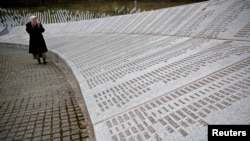At the United Nations Wednesday, the international community commemorated the 20th anniversary of the genocide at Srebrenica, where more than 8,000 Bosnian Muslim men and boys were systematically murdered by Serbian forces because of their religious faith.
They were some of the darkest days Europe had seen since World War II. Bosnian Serb forces besieged the enclave of Bosnian Muslims on July 11, 1995 and began killing more than 8,000 men and boys. Women and girls were raped and forcibly deported.
Adisada Dudic was five years old in 1995 when her father loaded her, her heavily pregnant mother and her sisters into a truck to leave temporarily to safety. They ended up spending the next three years in refugee camps in Slovenia.
“My childhood memories are those of fear, bloodshed and fire. I spent every day waiting for my dad to appear. Every man that passed through the refugee camp reminded me that my dad was not there,” she said.
Dudic was one of the lucky ones; her father survived.
The U.S. ambassador to the United Nations, Samantha Power, was a young journalist in the Balkans and reported on the massacre, later writing a Pulitzer prize-winning book about genocide. She told VOA that her experiences there have influenced her work as a diplomat.
“And so all of my commitments to human rights, to transitional justice, to preventing mass atrocity, to reconciliation in the wake of conflict, all of that for me personally, grows out of the experience of having covered the war in Bosnia, but also having had the misfortune of bearing witness from afar, from Sarajevo, to the systematic slaughter of 8,000 Muslim men and boys,” she said.
The United Nations Security Council is expected to adopt a resolution early next week commemorating the 20th anniversary of the genocide. The British delegation has written the draft, which diplomats say closely resembles the language of a similar resolution adopted last year commemorating the Rwandan genocide, including condemning the genocide and those who deny it. The resolution also calls for accountability for perpetrators and urges educating future generations to prevent the recurrence of such atrocities.
British Ambassador Matthew Rycroft says the resolution is balanced and intended to honor the lives lost and look to the future.
“It’s about reconciliation; it’s about learning the lessons from Srebrenica. We often say never again, and we need to make sure we mean it,” he said.
Russia has circulated a proposal of its own, one which does not mention Srebrenica by name and condemns generally the crimes committed throughout the conflict in the former Yugoslavia.
Moscow has previously acknowledged that the massacre in Srebrenica was a genocide.
Some Serbian and Bosnian Serbian politicians have urged Russia to veto the British resolution, but Ambassador Power said she expected it would be adopted.
“I do expect it to be adopted. I want to assure the people of Bosnia above all, that there is broad global consensus about what happened in Srebrenica in July of 1995; there is not a lot of confusion about that. For political reasons, people may want to divert attention and that’s unfortunately what we deal with in the world,” she said.
The vote is expected early next week.




